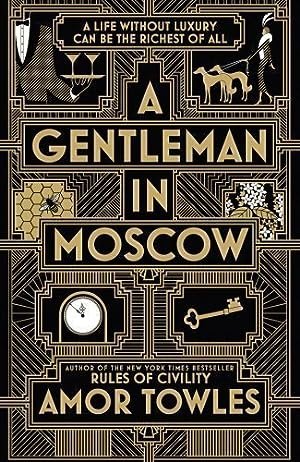A Gentleman in Moscow - Amor Towles - Book Review
What is ‘A Gentleman in Moscow’ about?
'A Gentleman in Moscow' by Amor Towles begins with the trial of Count Alexander Rostov in Russia, 1922. Even though he is from nobility, the decision is made not to execute him, as he wrote a poem that made him a revolutionary hero. Instead, he is to live under house arrest in the Metropol hotel, in Moscow. If he steps outside he will be shot.
However, he is not to live in his luxurious suite, but in a tiny room in the 6th-floor belfry, which previously housed servants. He accepts his reduced situation and finds delight in the smaller details of his surroundings. The Metropol is his world, and it's from here, frozen in time, that he witnesses Russia's tumultuous 20th century unfold.
Who would have imagined when you were sentenced to life in the Metropol all those years ago, that you had just become the luckiest man in all of Russia?”
Russophile
In my early twenties, I went through a period when I became obsessed with Russian writers. It was Henry Miller who got me into them, as he kept quoting them in his books. That led me to Dostoyevsky, Solzhenitsyn, Checkov, and of course, Tolstoy. I was a bit of a Russophile.
My copy of 'War and Peace' was a Wordsworth classics edition that cost £1 in bargain books, Belfast. I thought I was getting a great deal, but with 45 lines to a page, any money I saved was spent tenfold over the years on eye tests and spectacles. But as hard as it was to read, I completely immersed myself in Tolstoy's masterpiece.
I became fascinated with Russian society and its history. Counts and princesses, soirees and weddings, Napolean and the battle of Austerlitz. I sometimes got confused keeping up with the cast of 500 characters, but I got completely swept away by the scale of the book, the tortured inner lives of its characters, and the details of the battles.
Indeed, the count says it better than I ever can.
'Can you conceive of a work greater in scope than war and peace? One that moves so deftly from the parlour to the battlefield and back again? That so fully investigates how the individual is shaped by history, and history by the individual?
Oddly enough, another book that features in 'a Gentleman in Moscow' is Montaigne’s book of essays that I have kept alongside me since my 20s. It's perfect for dipping into; chapters on everything from idleness, liars, smell, sleep, and solitude, etc Although he does read it, The Count also finds it handy for leveling out his wonky table.
Rules of civility.
I had previously read another of Amor towles book's entitled 'Rules of civility'. It was set in New York 1938, among smoky jazz clubs and martinis, and I found it a stylish and graceful read, and social climber Katey was a great character to spend time with.
I found 'A gentleman in Moscow' a pleasure to read from start to finish. I can't remember the last time I certainly smiled my way through a book as much as I did this. How could you not? It's elegant, charming, and at times just funny - the Count is great fictional company. And I loved some of the set pieces - the bouillabaisse recipe, the seating plan in the restaurant, too many to mention without spoiling the surprise of reading it.
I usually have a couple of books on the go, switching between them as per my mood. However, in the case of 'A Gentleman in Moscow' everything else was cast aside and I gave myself over completely to the Metropol Hotel and its residents.
Count Alexander Rostov
The count is such a rounded character. His upbringing, heartbreak, and loss all make him the man he is. Such loyalty to his friends, and a man of impeccable taste and manners, He's dignified, intelligent, kind, and moral, and I can't think of a character I enjoyed spending time with more in my recent readings. He likes good wine, good company, and a good book.
He's also not interested in recrimination or bitterness. But there is pain and grief in his life, a deep sadness that he carries in his heart and that threatens at times to overwhelm him.
He's a man of many interests, able to speak about wine, food, impressionism, philosophy, and of course Russian writers and poetry. In fact, one of my favorite scenes in the book is when he describes the three greatest things that Russia has given the world.
As well as the wit, the book is full of philosophical musings, peppered with Greek myth. It's also a book about friendship, about parenting, and making the best of a bad lot.
I loved his friendship with Nina, which felt wonderfully natural and is very much the beating heart of the book. As a nine-year-old, she is initially fascinated both by princesses and the Count's handlebar mustache, and acts as his guide to the more interesting parts of the hotel.
Metropol Hotel Moscow
But there are just so many great characters and a wonderful supporting cast. There's Emile the tempestuous chef with his meat cleaver, Andrey the Maitre D, and wonderfully named 'willowy woman' Anna Urbanova, star of the silent movies. Osip the Secret policeman and of course his friend Boris. And not forgetting his sister Helen:
"Every year that passed, it seemed a little more of her had slipped away; and I began to fear that one day I would come to forget her altogether. But the truth is: No matter how much time passes, those we have loved never slip away from us entirely.”
The staff of the hotel becomes his family, his confidants, and his best friends. The book has a lot to say about loyalty and friendship, and you get to learn why the count felt so lucky.
It's also a book with a great soundtrack. I haven't listened to as much music whilst reading since Harry Bosch sat flicking through his murder books in the Hollywood hills on the balcony with his beloved jazz in the background. Of course, there's Rachmaninov and Tchaikovsky, but Chopin and Mozart as well.
"After all, what can a first impression tell us about someone we’ve just met for a minute in the lobby of a hotel? For that matter, what can a first impression tell us about anyone? Why, no more than a chord can tell us about Beethoven, or a brushstroke about Botticelli. By their very nature, human beings are so capricious, so complex, so delightfully contradictory, that they deserve not only our consideration but our reconsideration—and our unwavering determination to withhold our opinion until we have engaged with them in every possible setting at every possible hour.”
Prose
What a writer Amor Towles is. The prose is so stylish, lyrical and languid, and I felt myself falling under his spell for hours at a time. It has its own lilting rhythm and it was a pleasure to spend time reading it. The rooms are characters in their own right, with hidden staircases, wine cellars, and opulent dining rooms. If I ever make it to Moscow, it would be a dream to visit the Metropol.
"Alexander Rostov was neither scientist nor sage; but at the age of sixty-four he was wise enough to know that life does not proceed by leaps and bounds. It unfolds. At any given moment, it is the manifestation of a thousand transitions. Our faculties wax and wane, our experiences accumulate and our opinions evolve--if not glacially, then at least gradually. Such that the events of an average day are as likely to transform who we are as a pinch of pepper is to transform a stew."
Glad I read this on the Kindle - there were lots of Russian/french terms I didn't know. The count is so erudite and urbane that you don't know what he's going to refer to next, and I enjoyed learning plenty more food and cultural references. Amor Towles also has an incredible knowledge of Russian history, society and culture.
..what matters in life is not whether we receive a round of applause; what matters is whether we have the courage to venture forth despite the uncertainty of acclaim.”
The Lincoln Highway
I felt bereft when I finished this book. I wanted to spend more time with the count and the rest of the characters in the Metropol - what a perfectly formed world Amor Towles created here. It's been a while since I connected with a book as well as I did with this one, which for me is pretty close to my idea of perfection in literature. I have 'The Lincoln highway' in my TBR pile and it won't be there for long.
"He had said that our lives are steered by uncertainties, many of which are disruptive or even daunting; but that if we persevere and remain generous of heart, we may be granted a moment of lucidity—a moment in which all that has happened to us suddenly comes into focus as a necessary course of events, even as we find ourselves on the threshold of the life we had been meant to lead all along.”
Is ‘A Gentleman in Moscow’ based on true story?
It’s not, but the events that take place in the 20th century are very much part of Russian history. So although it’s historical fiction, the Metropol hotel in Moscow is very much a real place, built in 1905 and open to visitors.
A Gentleman in Moscow Summary
It doesn't fall into one category. Historical fiction as an umbrella I suppose is easiest, but it's also a bit of a thriller, with some romance, politics, espionage - it ticks a lot of boxes, and does them all well.
It’s that rarest of things - a literary page turner that you just can’t put down. Amor Towles is a master craftsman, bringing to life characters that you care for, whilst giving you plenty to laugh and smile about along the way. And yeah, a nice warm feeling.
And what an ending. Sometimes when a book is so well written, with such beautifully realised characters, I feared I was going to be disappointed by the ending to what was such a satisfying read. I had nothing to worry about - this has a wonderful setup that was pitch-perfect.
Seems apt to finish with one final quote.
The count restricted himself to two succinct pieces of advice from Montaigne; the first was that if one did not master one's circumstances, one was bound to be mastered by them; and the second was Montaignes maxim that the surest sign of wisdom is constant cheerfulness.
462 pages, Paperback
March 26, 2019 by Penguin Books
I was interested to read that Ewan McGregor is set to star as the count in a forthcoming TV production. Currently halted due to the writers strike, but a possible December 2023 release has been mooted.
April 24 Update - Just watched the first episode, and though it’s early days, I think they’ve done a great job. Really enjoying this.



